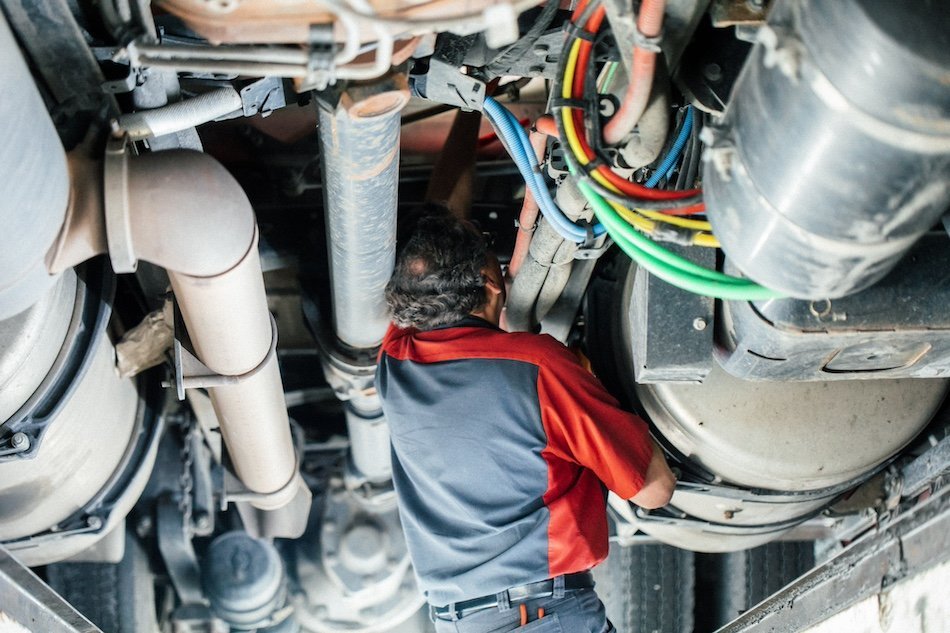Understanding the Basics of Heavy-Duty Diesel Engine Mechanics
In the trucking world, heavy-duty diesel engines are the heart of every vehicle on the road. They power the long hauls, keep deliveries moving, and fuel the backbone of countless industries. At Doug Andrus Distributing, we depend on these machines every day, which is why understanding how they work isn’t just technical knowledge—it’s essential to maintaining performance, safety, and reliability across our entire fleet.
What Makes Diesel Engines Different?
Diesel engines operate on a fundamentally different combustion process than gasoline engines. Rather than using spark plugs to ignite fuel, diesel engines compress air to extremely high pressure and temperature, then inject fuel directly into the cylinder. This high-pressure environment causes the fuel to ignite spontaneously, resulting in a more efficient, torque-heavy engine that’s built to handle tough loads and long distances.
That efficiency is exactly why freight transportation companies like ours rely on diesel power. With better fuel economy, longer service intervals, and greater torque output, diesel engines are built for endurance.
But their performance comes with complexity. Heavy-duty diesel engines feature high-pressure fuel systems, advanced turbochargers, emissions control technologies, and cooling systems that all need to function in harmony. At Doug Andrus Distributing, we emphasize regular maintenance to keep every piece of that system working as it should.
Want to keep your fleet running longer and stronger? Learn how routine upkeep protects your investment in Why Regular Maintenance is Crucial for Heavy-Duty Diesel Engines.
Key Components of a Heavy-Duty Diesel Engine
When you break it down, a diesel engine is a collection of interdependent systems. Here are a few of the most critical components:
Fuel Injection System: Precisely delivers diesel fuel into each cylinder at high pressure for efficient combustion.
Turbocharger: Forces additional air into the engine to boost power without increasing engine size.
Cooling System: Regulates engine temperature using a water pump, radiator, and thermostat.
Air Intake System: Provides clean, filtered air for the combustion process.
Exhaust and Emissions System: Directs exhaust gases safely out of the engine and reduces pollutants through selective catalytic reduction (SCR) and diesel particulate filters (DPFs).
When one part starts to go, others often follow. That’s why our commercial truck repairs focus on diagnosing the full engine system, not just the obvious issues. We know that treating the root cause keeps downtime to a minimum and performance at a maximum.
Signs Something's Off Under the Hood
No one wants to see a check engine light pop on, but diesel engines have their own set of warning signs that something’s not right. Here are a few common indicators:
Loss of Power: If a truck isn’t pulling like it used to, it could point to fuel system issues, clogged filters, or turbocharger problems.
Unusual Noises: Clunking, knocking, or hissing can all signal trouble in the combustion process or engine timing.
Excessive Exhaust Smoke: Black smoke suggests incomplete combustion; white smoke could mean coolant is leaking into the cylinders.
Poor Fuel Economy: A drop in MPG might stem from worn injectors, dirty air filters, or misfiring cylinders.
At Doug Andrus Distributing, we train our technicians to spot these signs early and act fast. Our priority is keeping trucks on the road and running at full strength, so our team is always watching for these red flags during routine maintenance.
Noticing unusual engine behavior or performance dips? Learn what to watch for in Common Signs of Mechanical Issues in Heavy-Duty Diesel Trucks.
Why Preventive Maintenance Pays Off
Heavy-duty diesel engines are built for endurance, but they’re not indestructible. Neglecting small issues can quickly turn into major repairs, especially when engines are under constant stress. That’s why preventive maintenance is a cornerstone of our operations.
We keep our fleet running efficiently through scheduled oil changes, filter replacements, coolant checks, and performance diagnostics. This proactive approach helps:
Reduce unplanned downtime
Improve fuel efficiency
Extend engine life
Minimize repair costs
Whether a truck is moving refrigerated freight, dry van freight, or tackling rugged loads with our flatbed freight services, it can’t do its job without a healthy engine. Investing in regular checkups ensures our vehicles stay dependable and safe.
Interested in exploring career paths behind the wheel? Discover the wide range of roles available in What are the Different Types of Trucking Jobs?
Emissions, Compliance, and Modern Engine Tech
Regulations around emissions have become much stricter over the past two decades. Today’s heavy-duty diesel engines include advanced emissions systems designed to limit pollutants without sacrificing performance. This includes technologies like:
Diesel Particulate Filters (DPF): Trap and remove soot from exhaust gas.
Selective Catalytic Reduction (SCR): Converts nitrogen oxides into nitrogen and water using diesel exhaust fluid (DEF).
Exhaust Gas Recirculation (EGR): Recirculates a portion of exhaust back into the combustion chamber to reduce temperature and emissions.
Maintaining these systems is just as important as the engine itself. Failure to do so can lead to costly fines and repairs. Our commercial truck repair program includes compliance inspections and emissions system checks to ensure every vehicle stays within legal and environmental standards.
Even minor issues can sideline a truck fast. See which small problems cause big setbacks in Top 5 Common Light Mechanical Issues in Heavy-Duty Diesel Trucks.
Supporting Our Drivers with Reliable Equipment
Heavy-duty diesel engines are only part of the equation. A well-maintained engine supports the entire operation—especially our drivers. At Doug Andrus Distributing, we offer some of the most competitive driver benefits in the industry because we believe that experienced, supported drivers are essential to our success.
We also know that no matter how skilled a driver is, they need equipment that’s up to the task. That’s why we pair driver excellence with reliable, high-performance trucks maintained by a top-tier service team. We keep our drivers safe, efficient, and proud of the rigs they run.
The Doug Andrus Distributing Difference
When you’ve got a business to run and freight to move, engine reliability isn’t optional—it’s critical. We’ve built our reputation by keeping our fleet running at peak performance, backed by over 85 years of industry expertise and a commitment to doing things right.
Whether you're looking for dependable carrier partnerships, interested in equipment for sale, or seeking a team that understands the ins and outs of heavy-duty diesel engine mechanics, Doug Andrus Distributing is here to help.
We have a long history of helping our customers succeed—and that starts by taking care of the engines that drive everything forward.
Contact us today to request a quote or learn how we can support your business with expert maintenance, reliable freight service, and a fleet built for performance.
Related Questions
What makes diesel engines better for heavy-duty use?
Diesel engines offer more torque, better fuel economy, and longer service intervals, making them ideal for hauling and long-distance driving.
How often should diesel engines be serviced?
Service intervals vary, but regular oil and filter changes, fuel system checks, and emissions inspections should occur every 10,000 to 25,000 miles.
What are common causes of diesel engine failure?
Poor maintenance, contaminated fuel, worn-out injectors, and overheating are common contributors to engine breakdown.
Can emissions systems affect performance?
Yes. Clogged DPFs or malfunctioning SCR systems can reduce power, increase fuel use, and trigger engine warnings if not properly maintained.

